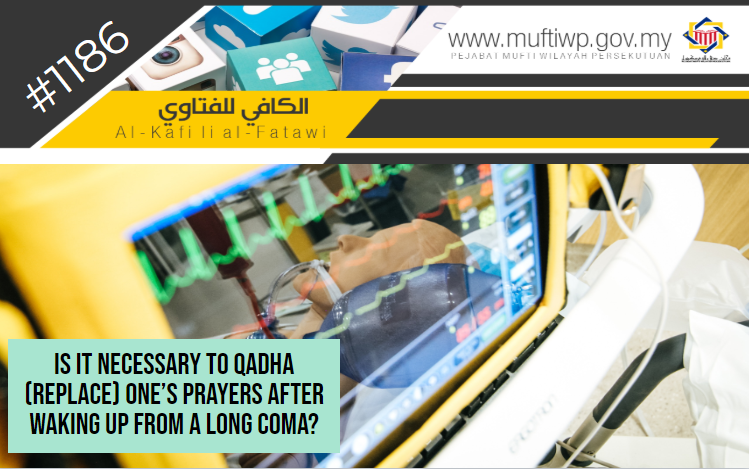Question:
Assalamualaikum wrm.wbt.,
For a person who was in coma for months, is it necessary for him to qadha his prayers?
Answer:
Waalaikumussalam wrm. wbt.
Alhamdulillah, praise and thanks to Allah for the countless blessings He has blessed us all with. Blessings and salutations to the Prophet Muhammad PBUH, his wives, his family, companions and all those that follow his teachings to the day of judgement.
The term coma is the condition of which a person is unconscious for a duration of time (usually caused by an accident or disease). (See 4th edition Kamus Dewan)
According to the above issue, we will start with the statement of Allah SWT:
لَا يُكَلِّفُ اللَّـهُ نَفْسًا إِلَّا وُسْعَهَا
“Allah does not charge a soul except [with that within] its capacity. It will have [the consequence of] what [good] it has gained,”
Surah al-Baqarah (286)
Syeikh al-Maraghi said: Allah SWT does not burden His slaves with something that they can’t bear. In fact, His blessings are easing their affairs. (See Tafsir al-Maraghi, 2/672)
Answering the above question, a person who was in a coma for a long duration of time does not need to qadha his prayers, for during the time he is not considered to be in his rational mind (unconscious). The reason is one of the conditions which obligate prayer is rational. Hence, it is not wajib for a person who is crazy, fainted, drunk and etc. to pray when they are not in their rational state.
This is stated in a hadith narrated by Ali bin Abi Thalib RA, where the Prophet PBUH said:
رُفِعَ القَلَمُ عَنْ ثَلَاثَةٍ: عَنِ النَّائِمِ حَتَّى يَسْتَيْقِظَ، وَعَنِ الصَّبِيِّ حَتَّى يَشِبَّ، وَعَنِ المعْتُوهِ حَتَّى يَعْقِلَ
“There are three (persons) whose actions are not recorded: a sleeper till he awakes, a boy till he reaches puberty, and a lunatic till he comes to reason.”
Sunan al-Tirmizi (1423) and Musnad Ahmad (956)
According to Syeikh al-Mubarakfuri, the phrase “المَعْتُوهِ” is meant for a person who is insane or in other similar condition. (See Tuhfah al-Ahwazi, 4/570)
Scholars analogically deduced a person who lost his rationality to be the same with an insane person regardless of whether it is for a short or long period of time. If he is cured and there is still time for him to pray (takbir for prayer) then it is wajib for him to pray. However, it is not wajib for him to qadha his prayer for the duration (he was insane). (See al-Mu'tamad fi al-Fiqh al-Shafi'i, 1/155)
Imam al-Nawawi explained in his book al-Majmu’: “Whoever lost his sanity because of something that is not prohibited in syarak such as becoming insane or fall into a coma or fainted or loss of rationality because he is sick or drink a medicine when there is a necessity for it or forced to drink something that causes him to get drunk and he lost his rationality, then it is not wajib for him to pray until he is conscious, it is also not wajib for him to qadha his prayer for the duration he was insane or when he fainted. This is our madhhab (madhhab Syafi’e).” (See al-Majmu' Syarh al-Muhazzab, 3/6)
Generally, we cite the opinions of jurists and madhhab for a better explanation and understanding on this issue. Scholars have differing opinions and their opinions are divided into the following:
- According to the opinion of madhhab Maliki and Syafi’e, it is unnecessary to qadha for the person is not considered as a mukallaf when he fainted or in a coma.
- Madhhab Hanbali: He should qadha his prayers.
- Madhhab Hanafi: He has to qadha if it does not exceed 6 prayers.
(See al-Mausu'ah al-Fiqhiyyah, 11/110)
If the condition is not for a long duration of time, then he should qadha his prayers. This is according to what is narrated:
أَنَّ عَمَّارًا أُغْمِيَ عَلَيْهِ ثَلَاثًا ، ثُمَّ أَفَاقَ فَقَالَ : هَلْ صَلَّيْتُ ؟ قَالُوا : مَا صَلَّيْتَ مُنْذُ ثَلَاثٍ ، ثُمَّ تَوَضَّأَ وَصَلَّى تِلْكَ الثَّلَاثَ
“Ammar once fainted for three nights. When he wakes up, he asks: Have I prayed?” They answered: “You have not prayed for three nights.” Then he performs ablution and qadha his prayers of three nights.”
Narrated by Ibn Abi Syaibah in al-Musannaf (2/268)
From Imran bin Husain and Samurah bin Jundub A.anhuma they also narrated a similar narration. And there is no khilaf (difference of opinions on the matter), it is as though there is a consensus of scholars on the matter. (See al-Mughni, 1/240 and al-Majmu', 3/8)
Conclusion
After analyzing the arguments and opinions of scholars and jurists, we are inclined to state that one has to qadha’ his prayers if he fainted for a short period of time such as less than three days and he doesn’t have to qadha’ his prayers if the duration of which he was in a coma is long or he fainted for a long time, which is for more than three days. This is the practise of the companions of the Prophet PBUH.
May Allah SWT grant us understanding in practising our religion in accordance with true Islamic teachings. Amin.


